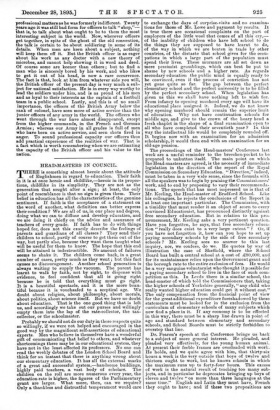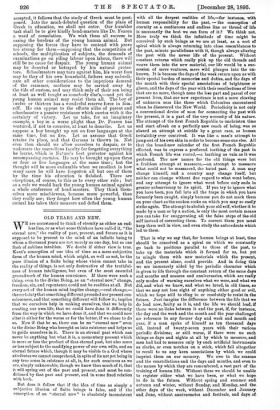HEAD-MASTERS IN COUNCIL.
THERE is something almost heroic about the attitude of Englishmen in regard to education. Their faith in it is at once heroic and childlike,—heroic in its propor- tions, childlike in its simplicity. They are not as the generation that sought after a sign; at least, the only point of resemblance is that no sign is given them. Their belief in education has all the characteristics of the genuine sentiment. If faith is the acceptance of a statement on the word of another, what definition can better express their condition ? We are all of us, in our place and degree, doing what we can to diffuse and develop education, and we are doing it chiefly on the advice and assurance of teachers of every grade. If faith has to do with things hoped for, does not this exactly describe the feelings of parents and guardians of all classes ? They send their children to school, partly of course to get them out of the way, but partly also, because they want them taught what will be useful for them to know. The hope that this end will be attained is indestructible. No amount of failures seems to shake it. The children come back, in a great number of cases, pretty much as they went ; but this fact causes no discouragement. Another school generation is always waiting to supply the vacuum. The parent has learnt to walk by faith, not by sight, to dispense with evidence, to feel confident that all is going right because he is told that everything must go right. It is a beautiful spectacle, and it is the more beau- tiful because it is vouchsafed to a sceptical age. We doubt about religion, about philosophy, about morals, about politics, about science itself. But we have no doubt about education. That is the one good thing that is left us, and accordingly we take out our purses and willingly empty them into the lap of the rate-collector, the tax- collector, or the schoolmaster.
Probably we should not do our duty in these respects quite so willingly, if we were not helped and encouraged in the good way by the magnificent self-assertions of educational experts. Men who believe in themselves have a wonderful gift of communicating that belief to others, and whatever shortcomings there may be in our educational system, they have not in the least affected its professors. No one can read the weekly debates of the London School Board and think for an instant that there is anything wrong about our elementary education. It has all the external marks of a great and successful system,—handsome buildings, highly paid teachers, a vast body of scholars. The children on the roll are more numerous every year, the education-rate is higher, the figures of the Parliamentary grant are larger. What more, then, can we require? Only a thankless and distrustful temperament would care to exchange the days of surprise-visits and no examina- tions for those of Mr. Lowe and payment by results. It is true there are occasional complaints on the part of employers of the little wool that comes of all this cry,— of the inability of children who have left school to do the things they are supposed to have learnt to do, of the way in which we are beaten in trade by other countries, of the distaste that school gives for the occu- pations in which a large part of the population must spend their lives. These murmurs are all set down as mere pessimist grumblings, which can best be put to shame by new schools and a higher rate. As regards secondary education the public mind is equally ready to be convinced, even if the process of conviction has not yet gone quite so far. The gap between the perfect elementary school and the perfect university is to be filled by the perfect secondary school. When legislation has given us this we shall have nothing left to wish for. From infancy to opening manhood every age will have its educational place assigned it. Indeed, we do not know why opening manhood should remain the superior limit of education. Why not have continuation schools for middle age, and give to the crown of the hoary head a fresh chaplet in the shape of a final examination open to all who have completed their seventieth year ? In this way the intellectual life would be completely rounded off. It begins now with an examination for an admission scholarship, it would then end with an examination for an old-age pension.
The proceedings of the Head-masters' Conference last week are a useful reminder to the breeches-pocket to be prepared to unbutton itself. The main point on which the Head-masters are agreed, is the necessity of immediate legislation in the direction of the report of the Royal Commission on Secondary Education. "Direction," indeed, must be taken in a very wide sense, since the formula with all the speakers was to begin by praising the Commissioners' work, and to end by proposing to vary their recommenda- tions. The speech that has most impressed us is that of Mr. Keeling, the Head-master of Bradford School. Like his colleagues, he rejects the conclusions of the Report in at least one important particular. The Commission, with a timidity that must render it an object of scorn to every convinced Educationist, has pronounced distinctly against free secondary education. But in relation to this pro- nouncement, Mr. Keeling asks a very pertinent question. Have you forgotten, he says, that free secondary educa- tion "really does exist to a very large extent " ? Or, if you have not forgotten it, how can you hope to set up paying secondary schools by the side of free secondary schools ? Mr. Keeling sees no answer to this last inquiry, nor, we confess, do we. He quotes by way of illustration the case of Sheffield, where the School Board has built a central school at a cost of £80,000, and for its maintainance relies upon the Government grant and the borough rate to the entire exclusion of fees. He would be a very sanguine voluntaryist who thought it possible for a paying secondary school to live in the face of such com- petition as this. In Leeds there is a similar school, the head-master of which told the Commissioners that, taking the higher schools of Yorkshire generally," any child who really wanted higher education could get it without cost." The only compensation from the financial point of view for the great additional expenditure foreshadowed by these statements must be looked for in the exclusion from the curriculum of elementary schools of many subjects which now find a place in it. If any economy is to be effected_ in this way, there must be a sharp line drawn in point of age and standard between elementary and secondary schools, and School Boards must be strictly forbidden to overstep that line.
Dr. Fearon's speech at the Conference brings us back to a subject of more general interest. He pleaded, and pleaded very effectively, for the young human animal. At present their feeble frames are overloaded with work. He holds, and we quite agree with him, that thirty-six hours a week is the very outside that boys of twelve and thirteen ought to work, but he knows schools in which the maximum runs up to forty-four hours. This excess of work is the natural result of teaching too many sub- jects, and in particular he deprecates bringing up boys of eleven and twelve "on more than three languages at the same time." English and Latin they must have, French they ought to have ; and if these two propositions are
accepted, it follows that the study of Greek must be post- poned. Into the much-debated question of the place of Greek in education, we shall not enter. Our humbler task shall be to give kindly head-masters like Dr. Fearon a word of consolation. We wish them all success in easing the burdens of the young human animal. But supposing the forces they have to contend with prove too strong for them—supposing that the competition of schools, the multiplication of subjects, the demands of examinations go on piling labour upon labour, there will still be no cause for despair. The young human animal may be deserted or betrayed by his natural protec- tors. Schoolmasters may turn against him, his worst foes may be they of his own household, fathers may subordi- nate all other considerations to the imperious demand of the crammer, mothers may be carried away by the tide of custom, and may think only of their son being at least as well taught as somebody else's,—and yet the young human animal may resist them all. The boy of twelve or thirteen has a wonderful reserve force in him- self. He can oppose to the efforts alike of parent and schoolmaster a passive resistance which carries with it the certainty of victory. Let us take, for an imaginary example, a boy in a worse plight than Dr. Fearon has ventured, if not to conceive, at least to describe. Let us suppose a boy brought up not on four languages at the same time, but on five. Let us assume that Greek retains its place, and that German is thrown in. Not even then should we allow ourselves to despair, or to underrate the marvellous faculty for forgetting everything he learns, which is Nature's best protector against his encompassing enemies. He may be brought up upon three or four or five languages at the same time ; but the thought will be more endurable when we recollect in how many cases he will have forgotten all but one of them by the time his education is finished. There are exceptions, of course, to this as to every other rule ; but as a rule we would back the young human animal against a whole conference of head-masters. They think them- selves more mischievous, because more powerful, than they really are ; they forget how often the young human animal has taken their measure and defied them.



































 Previous page
Previous page